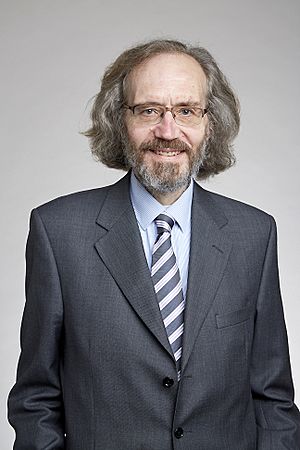Roger L. Williams facts for kids
Quick facts for kids
Roger L. Williams
FRS FMedSci
|
|
|---|---|

Williams in 2017
|
|
| Alma mater | |
| Awards | EMBO Member Morton Lectureship |
| Scientific career | |
| Fields |
|
| Institutions | University of Cambridge Laboratory of Molecular Biology Rutgers University Cornell University Boris Kidrič Institute, Belgrade |
| Thesis | The Structures of Two Ribonuclease B containing Crystals (1986) |
Roger Lee Williams is a British structural biologist. He leads a research group at the Medical Research Council (MRC) Laboratory of Molecular Biology. His team studies the shape and movement of tiny protein complexes. These proteins work with lipid cell membranes, which are like the outer skin of cells. His research helps us understand how these important cell parts are built and how they work.
Contents
Learning and Early Career
Roger Williams went to college at Purdue University and Eastern Washington University. He earned his PhD in 1986 from the University of California, Riverside. For his PhD, he studied the structure of a protein called ribonuclease.
Before joining the MRC Laboratory of Molecular Biology, Williams worked at other universities. These included Rutgers University and Cornell University in the United States. He also worked at the Boris Kidrič Institute in Belgrade, Serbia.
Important Research Discoveries
Roger Williams's team focuses on a group of enzymes called phosphoinositide 3-kinases (PI3K). These enzymes are like messengers inside our cells. They help cells communicate, sort out waste, sense nutrients, and even repair their DNA.
How PI3K Enzymes Work
The PI3K enzymes are very important for cell health. If they have mutations (changes), they can cause problems. These changes are often found in human tumours, which are abnormal growths. Williams's lab studies how these changed PI3K enzymes lead to oncogenesis, which is the start of cancer. They also look for ways medicines can specifically target these problem pathways.
His group has found out how a specific PI3K enzyme, called p110 alpha, changes its shape to become active on cell membranes. They showed that cancer-causing mutations make PI3K enzymes active by copying or boosting these shape changes. His team is also learning how the cell membrane's shape affects how sensitive PI3K enzymes are.
Funding for Research
Many organizations have supported Roger Williams's research. These include Cancer Research UK, the Medical Research Council, and AstraZeneca. Other supporters are the Biotechnology and Biological Sciences Research Council (BBSRC), the Wellcome Trust, and the British Heart Foundation.
Awards and Recognitions
Roger Williams has received several important awards for his scientific work. He is a member of the European Molecular Biology Organization. He is also a Fellow of the Academy of Medical Sciences (FMedSci). In 2017, he was chosen as a Fellow of the Royal Society (FRS). This is a very high honor for scientists in the United Kingdom. He also received the Morton Lectureship from the Biochemical Society.

